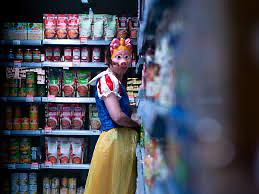Everything Must Go
Douban
Alles Moet Weg
visão geral
In Everything Must Go, Dries Verhoeven turns his gaze to the moral frictions of our late-capitalist society. In a continuous, six-hour installation, the visitor becomes part of a living supermarket setting in which shoplifting is examined. What drives the “proletarian shopper”? And how ethical are we really, when no one is looking?
In his latest living installation, Dries Verhoeven explores shoplifting. Since the introduction of self-checkout registers, shoplifting has been on the rise. This phenomenon inspired Dries Verhoeven to examine the moral frictions within our late-capitalist society. He engaged in conversations with 24 people who occasionally "forget" to pay, with thieves in detention, and with those who see theft as a form of political resistance. These proletarian shoppers and self-proclaimed Robin Hoods were invited to reflect on themselves and the world they operate in.
Among the ruins of the free market, he discovered a group of cynical consumers who have internalized the opportunism of their economic environment—why be virtuous when the world is falling apart? Yet, much like supermarkets themselves, these individuals present themselves as exemplary in public; ethics become more a matter of image than principle.
Everything Must Go is a living installation that can be visited continuously for six hours per day. Inside a gallery, a replica of a supermarket aisle is set up, equipped with numerous CCTV cameras. A performer, dressed in a Snow White costume and wearing a pig mask, embodies the neoliberal consumer. The role is alternated between Isadora Tomasi and Annica Muller. Visitors can walk around the installation, peek in between the products, or follow the events inside the supermarket via screens. Like surveillance officers in a panopticon, they observe the “suspicious subject.” In defending her own actions, she dissects the contradictions of her economic surroundings. The text is based on interviews with people with lived experience and on the words of Jean Genet, Karl Marx, Ruben Östlund, Rachel Shteir, Mathild Clerc-Verhoeven, and Slavoj Žižek.